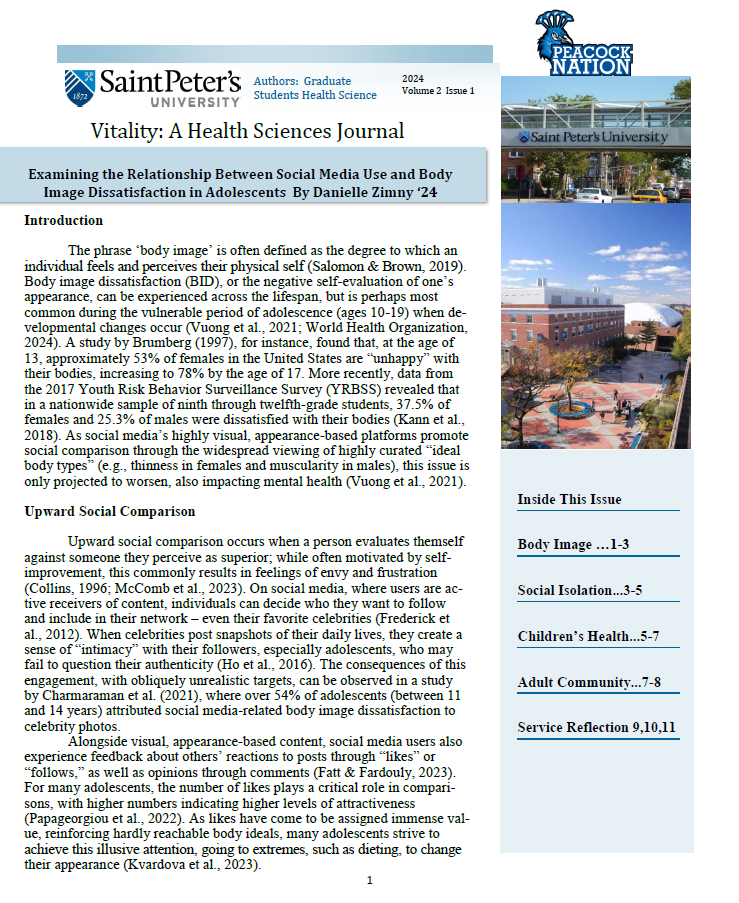Become a Leader in Healthcare and Respond to Critical Needs with an M.S. in Health Science
Want more information on the M.S. in Health Science program? Fill out our form and a representative will be in touch!
Today’s leaders and citizens are more aware than ever of the delicate interconnectedness of our health, cultures, economics, politics and the socioeconomic disparities within our communities. When you earn a Master of Science in Health Science from Saint Peter’s University, you’ll develop the expertise and professionalism to address these factors in healthcare and make positive impacts on local and global communities through rigorous scientific research and implementing practical solutions.
As a student in our graduate health science degree program, you’ll work with highly esteemed faculty mentors who bring their years of experience in research and fieldwork into their classrooms to prepare you for the rewarding new challenges of health science careers.
Three degree concentration tracks let you align your health science degree with your professional goals. Our curriculum covers cultural diversity, ethics, health behavior, education and more. Advance your existing skill set to stand out from others when you apply for jobs with a health science degree from Saint Peter’s.
Master of Science in Health Science at a Glance
Concentrations: Health Leadership, Health Education, General Studies
Course Format: Online—flexible hours
Program Duration: One year (full-time, 9 credits per trimester, including summer sessions) or within 15 months (completing a minimum of 6 credits per trimester and summer sessions)
Calendar: Trimester (11 weeks, with additional summer courses)
Cost: $720 per credit
Why Choose the M.S. in Health Science From Saint Peter’s?
Our graduate health science degree program will prepare you to work within, lead or educate interprofessional healthcare teams and improve overall health-related outcomes in the world around you. With service-learning opportunities, experienced faculty mentors and comprehensive research projects, you’ll have the training and help you need to succeed both as a student and as a professional.
- Learn from dedicated health science experts: Thanks to small class sizes, you’ll benefit from one-on-one time with health science faculty mentors who are accomplished researchers, authors, healthcare consultants and advocates for those most in need of their help.
- Perform research to address real health issues: Develop publishable research in your chosen subfield and see your work in a departmental journal. Students interested in global health science will create proposals and actionable solutions to address a specific disease in a foreign country.
- Give your time and expertise to others: The core of our program is the real-world application of the lessons you learn in your health science classes. That’s why you’ll have opportunities to engage in community service projects and service learning to work to improve the lives of others within your community.
Three M.S. in Health Science Concentrations
You’ll be qualified for many jobs with a health science degree from Saint Peter’s, and to help you develop a specialty to stand out in a certain field, we offer three degree tracks: Health Leadership, Health Education, or you can select courses from both tracks as the General Studies track in Health Science. Our curriculum of six core courses, two general electives, three track-specific courses and a capstone experience provides an individualized experience for every student.
100 Percent Online
Whether you’re a recent high school graduate or a working professional with a family, we know how important your time and schedule are. That’s why we provide an entirely online Master of Science in Health Science that lets you connect from anywhere and engage with our renowned faculty. Our online format delivers maximum flexibility, allowing you to earn your graduate health science degree around your schedule.
Who Should Apply for the M.S. in Health Science?
If you want to advance your knowledge of health science, educate health professional students, conduct research or obtain a leadership position in healthcare organizations, our M.S. in Health Science is the ideal degree to help you achieve your career goals.
We’ve designed our Master of Science in Health Science to accommodate:
- Working healthcare professionals in allied health fields.
- Professionals from broader health-related areas, such as health education.
- Students with backgrounds from a variety of areas, such as biology, biochemistry, biotechnology, psychology and sociology, who wish to develop specialized skills and leadership roles in a health-related field.
The health science program can also provide an option for students continuing on to health-related professional programs or doctoral studies.
Career Opportunities for M.S. in Health Science Graduates
With your graduate health science degree from Saint Peter’s, you’ll be prepared to lead teams and educate health professionals—as well as impact the healthcare system at all levels. Employment for professionals in healthcare is expected to grow by 13 percent by 2031, according to the U.S. Bureau of Labor Statistics. That’s much faster than the average for all occupations.
Graduates from our Master of Science in Health Science program find successful careers in a diverse range of settings, such as hospitals, nursing homes, government agencies, schools, homeless shelters and nonprofit organizations.
You’ll be prepared for many exciting positions and jobs with a health science degree from Saint Peter’s, including:
- Health educator
- Clinical researcher
- Supply chain manager
- Administrator
- Community health organizer
- Director of clinical services
- Clinical director
Start Your Health Science Career Today
Our M.S. in health science offers you the expert guidance and practical skill set to excel as a health science professional in many industries across the globe. With an entirely online curriculum, you can advance your career on your own terms.

